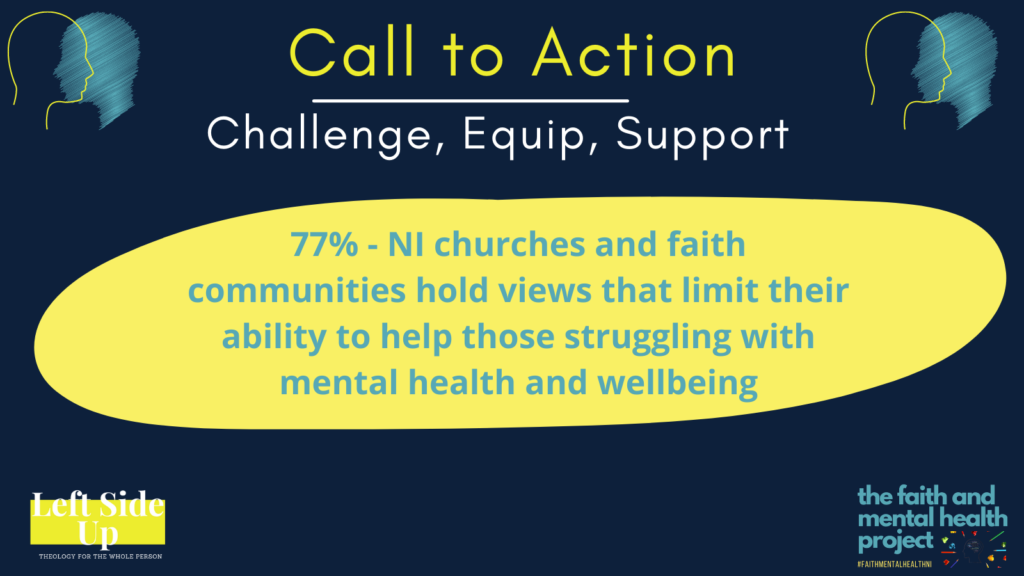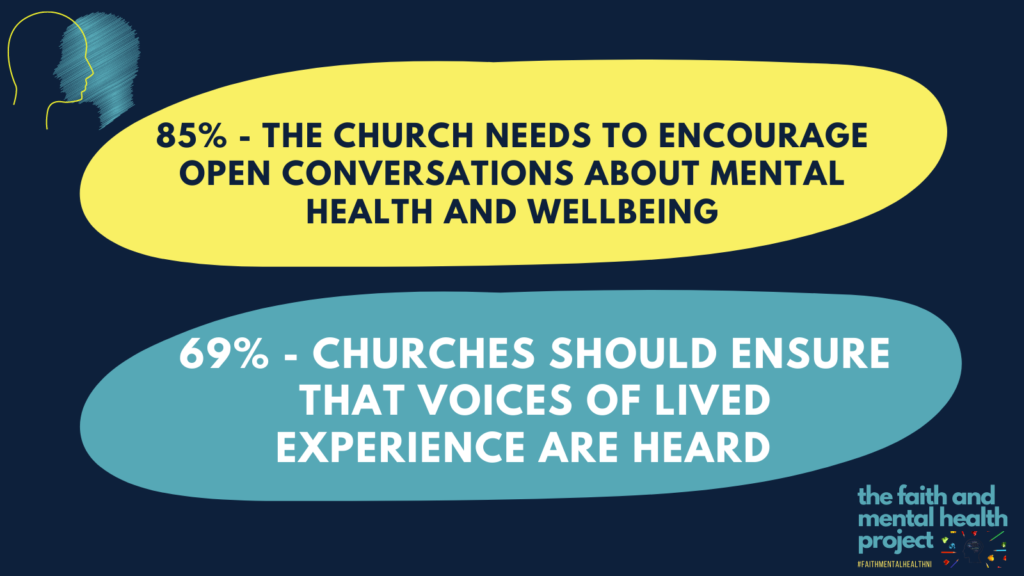Andrew Cunning, Director of Left Side Up, highlights some of the main findings of a recent report on the role of faith communities and churches in mental health promotion.
Heart, soul, mind and strength. That’s what we are, according to the New Testament. Brain, mind, body and spirit. This fundamentally religious notion of what it means to be a person is crucial here in Northern Ireland given the sheer number of us affiliated to churches and faith communities, and just how many of us hold a religious faith. This is why we at Left Side Up established the Faith and Mental Health Project in late 2020. As a progressive faith organisation we wanted to explore the interface between mental wellbeing and faith, listening to lived experience of people of faith right across NI and explore ways of improving mental health provision in our churches.
We launched an online survey in December 2020 to get a bird’s eye view of the overlaps between faith and mental health, asking questions around Bible reading, beliefs held by churches, the quality of welcome in churches and alternative spiritual practices. We also issued an open invitation to members of faith communities who wanted to go a little deeper, to sit with us in an interview setting. We spent over 20 hours listening to stories of hurt and hope, of mental ill-health and the benefits and drawbacks of certain theologies. Around 150 people contributed their perspectives and experiences to this research. What we heard surprised, humbled and energised us.
‘Call to Action’
In June 2021 Left Side Up launched our ‘Call to Action’, a 25-page report based on the findings of our research. Prof. Siobhan O’Neill, the NI Mental Health Champion, praised the publication as a “trauma-informed approach to mental health in faith communities” and NI Health Minister Robin Swann officially endorsed the research. Perhaps the two most striking statistics emerging from the project are that 100% of all participants thought that churches have a role to play in mental health and wellbeing yet 51% of participants reported that churches in NI are not places of genuine welcome.
The first finding is an encouraging one for church leaders. That there was total agreement that churches should feel part of the mental health conversation and empowered to act is a powerful endorsement of the role of faith in emotional wellbeing. The second statistic is a sobering one. Slightly over half of respondents felt that the welcome they received was either not genuine or non-existent. This percentage holds dozens of stories from members of the LGBTQ+ community, from women, from people in non-traditional relationships or family units.
We heard stories of ‘conversion therapy’ (the pseudo-scientific, pseudo-Christian attempt to change someone’s sexual orientation) and experiences of casual misogyny from within faith communities. The hurt felt by those who have been excluded from church, either officially or by theologically justified shame, was palpable and heart breaking. A church culture of ‘respectability’ emerged from these stories, an environment in which difference is, implicitly or explicitly, held to be something requiring a solution rather than a reality to be embraced and celebrated. A culture that cannot honour difference is one that can never be truly safe.

Recognising the challenges
When we talk about ‘the church’ there is a danger that we give a false impression of a homogenous bloc that holds a universal set of beliefs and practices. This is simply not the case. We heard from Baptists, Presbyterians, Methodists, Quakers, Church of Ireland members and Catholics. And while there are key differences inter-denominationally, it is important to note that there is a wide range of experiences emerging from within single traditions here.
On the issue of welcome, we found people from every church background expressing gratitude for the warm welcome they had received within their own church. This is wonderful news and these stories feel like truly Christian stories of open hospitality and unconditional inclusion. We also heard from a diversity of people who have never felt welcome.
The challenges facing the churches in terms of mental health support are, then, not to be simply levelled at one particular denomination. Over three-quarters of participants, for example, reported that NI churches hold views that limit their ability to support those struggling with mental ill-health. These beliefs range from insisting that more Bible reading, prayer and faith will cure mental health problems to teaching that mental ill-health is a test or punishment from God. And while not every church holds these views (far from it), it has been the experience of many people that faith communities here too quickly recommend spiritual fixes for what are mental health problems.
Considering ways to improve mental health support
The research makes it very clear that churches and faith communities here in NI have some work to do to improve their support for people with mental ill-health. The good news is that the participants in this project were clear in providing some concrete and practical recommendations. At least half of respondents recommended that church leaders, staff and volunteers be trained in Mental Health First Aid. This came through majorly in the interviews too, with a majority of interviewees insisting that appropriate mental health training be made mandatory for any and all leaders within a church organisation.
Similarly, a majority of participants encouraged the church to better signpost support for mental health within the church building itself. Too often, the flow of information for services and support from beyond the church walls is limited and patchy. Participants say this needs to change, as people struggling with mental health need a genuine range of options for support.
Finally, our respondents felt that hearing the stories of experts from lived experience in church is essential. Being able to listen to the experiences of people who have mental ill-health, who are being treated, who have survived were identified as potentially life-saving interventions. Genuinely letting these stories be told by the people who experienced them, respondents suggested, would begin to create a church culture of openness, one that doesn’t let stigma and shame grow in silence.

Opening new conversations
The ’Call to Action’ is available freely for all who wish to read it. We would especially encourage people of faith to read the lived experience testimony of fellow Christians here in Northern Ireland. There is work for all of us to do. Whether you are a regular church attender or a committed atheist, simply reading the report will give you something of an idea of how to better support the mental wellbeing of people of faith. It will hopefully give you some of the right language and will certainly grant you more of a picture of the religious landscape of our country.
And while the report is designed to challenge, equip and support churches, we hope that it encourages open conversation between friendship groups and families. Nothing ever gets better when it is hidden, when it can’t be spoken of. This is true of mental health generally, and it is especially true of the overlaps between mental health and faith. Talking about mental health can be tricky enough in NI, but within faith contexts it can seem impossible, such is the complexity of the Northern Irish identity.
Too often, churches are not places of open dialogue, where we can bring our whole selves without fear of judgement. This has to change. It will change. Church ought to be for everybody and it ought to be a safe place. We hope by shining a light on the many excellent things our churches do will encourage more churches to act and to join this essential, life-saving conversation. We also sincerely hope that the challenges of this report inspire genuine reflection from church leaders and people of faith.
We, as people, are heart, soul, mind and strength. Let’s take a big step in living up to the implications of this truth.
More on Northern Slant:
- Northern Slant Hosts: Siobhaán O’Neill – an interview with Roger Greer
- Life is harder right now. We should be kinder to ourselves by Hannah Sothers
- NI parents need better support, survey shows by Christopher Eisenstadt of Parenting NI
